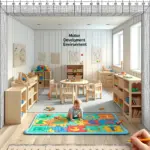infant reading programs – Foster a Lifetime of Learning
Embark on the rewarding journey of infant reading programs, starting not with your child’s first word but the first story you share.In an age where literacy is the key to limitless knowledge, enrolling your child in an infant reading program could be the most precious gift of all. But it’s not just about the words on a page; it’s about nurturing a bond, understanding their tiny, bustling world, and making each step on their reading journey count.
We are going to cover the concepts for teaching a young child to read. There are certain rules that should not be broken otherwise you will lose your child’s membership.
- Your child is busier than it seems. When most parents observe their child, many think that they have nothing to do, that it is the adults who have occupations, work. If you think like this you will have a lot of difficulty teaching your child something. Far from being idle, a baby is engaged in constant, bustling activity.
- He will spend a lot of time acquiring motor skills with real effort that we are far from accomplishing in our adult lives. Watching a baby who really seems to be struggling to lift his heavy head when he is on his belly. This is the opposite of someone who is unoccupied. Your baby will learn your language (and all the languages he can listen to, by the way) starting from no other language. This is a very difficult intellectual task that would discourage most adults. Your baby is very busy on a motor level but also intellectually. I emphasize a lot on these ideas which do not have a direct relationship with reading because you cannot pretend to teach your baby something without taking these elements into consideration.
- Everything you teach him should not disrupt what he is already learning in term of motor skill or intellectual skill. Effective infant reading programs suggest using brief learning windows—just five or six seconds per sequence to captivate your baby’s attention. We advise you not to seat your baby beforehand, do not seat him if he is four feet away, this would artificially lengthen the sequence. Your baby would actually have the impression that the sequence would begin the moment you placed him seated and for him the sequence would last for example one minute instead of six seconds.
- Never test your child. A baby under two years old is not able to speak. However, from the moment he is born you will communicate with him, instinctively you will talk to him about a lot of different subjects without at any time making sure that he has understood correctly. If you want to start teaching your baby to read, you will have to adopt the same attitude that you adopt for learning oral language. Never test your child. Babies do not like to be tested, if you expect results from them, you risk losing their support and perhaps even permanently. A baby realizes the importance of understanding oral language; he will never stop trying to understand what his big brother or his parents say. Instinctively he realizes that this learning is vital for him. However, he will not see the need to learn to read before being able to read his first sentences. Don’t risk losing their valuable support just to reassure yourself that what you are doing is effective. Ideally you should never test your child on reading, he will show you his skills at the appropriate time.
- The most concrete words are the easiest for your baby to learn. Your baby will learn the word cat much more easily if he has already seen a cat than the word rain. Rain is an abstract concept that is difficult for a baby to understand. It is not a manipulatable object that you can put in your mouth and then throw a little further (although neither can the cat!). The same goes for colors. It is very difficult for a baby to understand colors.
- Learning to read should only be undertaken by a parent who has plenty of time with their child. When you are active, when you work outside, you often have little time left with your baby at home. In such circumstances your child will need a lot of affection from you, he will want a bond with you. A reading program will be difficult to envisage in such circumstances. If you have a lot of time you may consider undertaking such a program. You will be able to give all the affection your baby will need and also distribute, for example, six sequences presented three times throughout the day. Our LittlePages app keeps track of your day’s progress. You will see small green dots below the sequence number reminding you that you have already presented once, twice… this sequence. Sequences which are not ready to be presented (because they have already been presented too recently) are circled in red and not green.
- Babies are hyperreceptive to your emotions. A baby who does not yet decode language will be more receptive to what you feel and in general a child is more sensitive to emotion than an adult. The way you present this reading program will be decisive for your child’s adherence. If you yourself think that it is very boring, that you do it and think of something else while you do it, that you would rather look at your phone… then there will be no chance that your child will think that you are doing it. presented something very interesting. You have to keep in mind that this is a big gift that you are giving to your child. Mothers and fathers who are very expressive are more successful in this learning and obtain better support from their child. Make these reading sessions a moment of friendly exchange with your child. If I tell you that it is important for a father to play cars, you love your child that is probably the reason for your presence on this blog. So you are going to play cars with your child to please him. But if I tell you that if you give your child early reading sessions it will improve his memory, his IQ, all of these cognitive skills and that your child will have an easier life thanks to great ease in his intellectual skills then you will follow this program with greater assiduity. What makes a baby happy is time spent interacting with his parents. Below the age of two, babies interact little with each other; it is truly the bond with their parents that will build their entire day. If you see this reading program as a moment of exchange with your baby, then you will be able to create a moment of conviviality and sharing. This will create a goal for you and give you plenty of opportunity to share with your child.
- Learning to read at an early age will have much greater impact than mastering this skill. You will greatly improve your child’s cognitive abilities, memorization, and IQ. Pediatricians agree that improving motor skills goes hand in hand with improving intellectual skills. Visit our post on motor skills here. If you want to go further on learning to read, visit our post on our LittlePages application.
Every story you read, every page you turn together, you’re not just teaching your infant to read—you’re opening their mind and heart to the wonders of language and the stories of the world.
In the end, the most profound lessons aren’t just about the mechanics of reading; they are about the connections we forge and the experiences we share. Our LittlePages app is here to accompany you on this incredible adventure, offering a guiding hand as you create those irreplaceable moments of learning and bonding.
So, to all the dedicated parents out there, remember that your enthusiasm, your time, and your love are the most powerful tools in teaching your infant to read. Embrace the joy of reading together, and watch as your child’s world expands with every word. Dive deeper into this journey with our comprehensive guides and let LittlePages be the companion that brings the joy of reading into your child’s life, one magical word at a time.
Are you ready to take the first step? Explore our infant reading program today and give your child the lifelong gift of reading. Let’s turn the page to a brighter future together. Elevate storytime with our infant reading program, a tailored approach to spark your infant’s curiosity and imagination through the power of reading.




